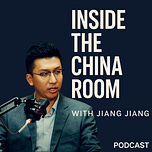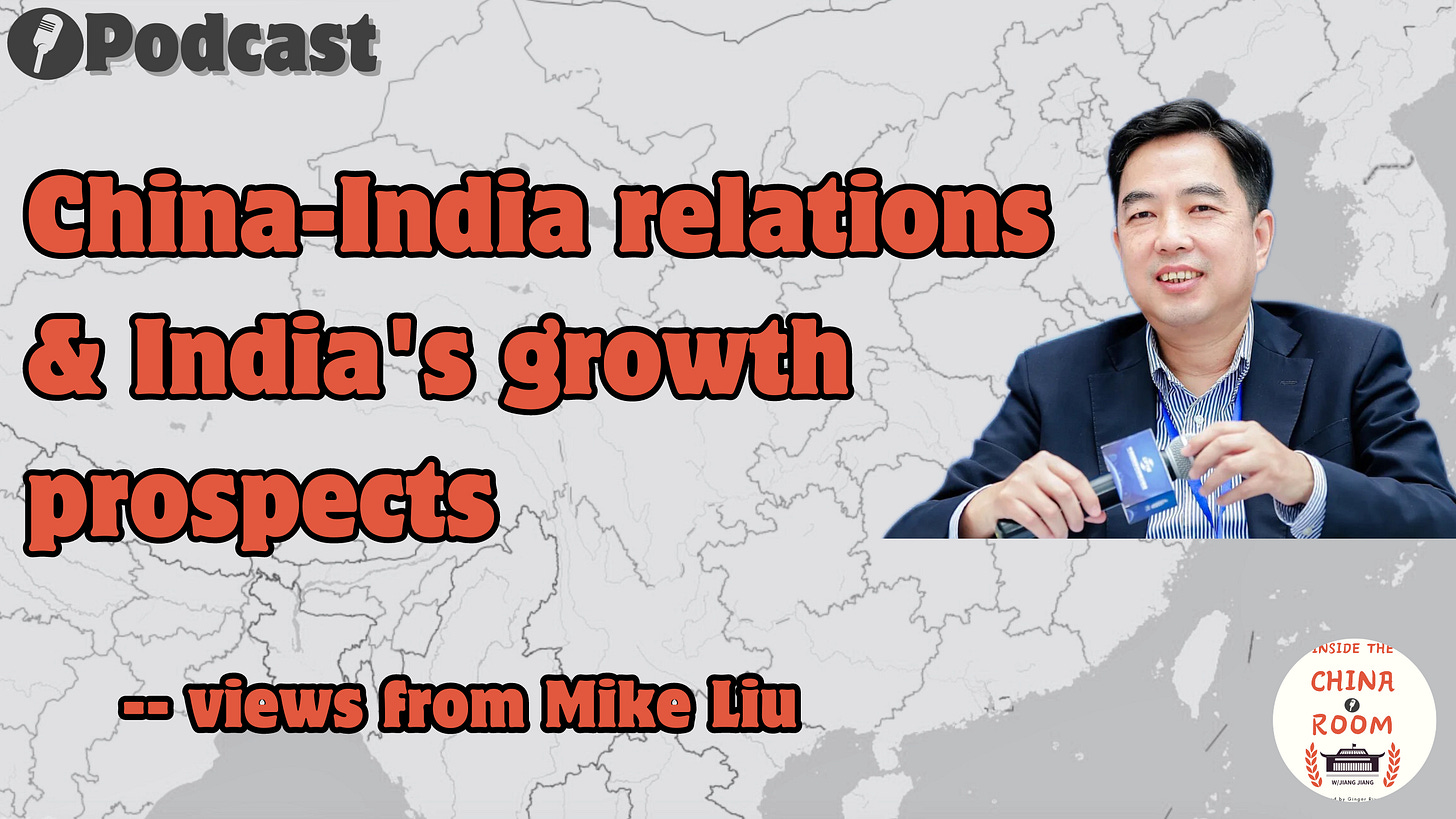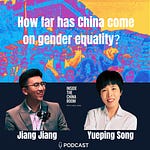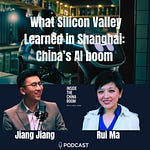This week on Ginger River Radio, Jiang Jiang (JJ) welcomes 刘宏 Mike Liu, who is Vice President, Senior Fellow – Center for China and Globalization (CCG), a leading non-governmental think tank in Beijing, and has an accomplished executive with 30+ years of professional experience in digital transformation, operational excellence, cross culture leadership development and market growth strategies with leading technology multinationals.
In this episode, Mike shares his perspectives on the primary misunderstandings between China and India, the commonalities they share, and the potential areas for strengthening their cooperation. Mike also delves into the prospects for India's economic growth in the future, and the role that its population plays therein. In addition, Mike and JJ discuss the potential future trends of the relationship between India and the United States, as well as the admirable traits and spirit that Indian entrepreneurs exemplify.
Mike is the former Managing Director and legal Rep for DXC Technology in Greater China region, and before that Mike was the global Vice President, Country Head and legal Rep for Infosys, an Indian Multinational corporation, in Greater China region. Mike’s experience spans across Greater China, US, Singapore, and India where Mike has demonstrated his unique capacity to accomplish the growth agenda for the organizations he has served.
Summary:
Speaking from his work experience from an Indian multinational company, Mike Liu says there are more things alike than people might expect between China and India, such as strong educational values and hard work ethics. He also regrets the misconceptions that Chinese may hold of India as underdeveloped and Indians of China as stagnant. With India strategically raising its global profile by hosting events like the G20 summit, there is no better time like now for more bilateral exchanges and mutual understanding.
India is changing, but don't expect this to be at the "Chinese speed", Liu says. Chinese enterprises need to be extra cautious of government policies when they explore the Indian market, and make special efforts to liaison with Indian authorities. The process may be tough, but Liu assures his audience that India has enough potential to be worth the hardships, with its growing and ever vibrant young generation.
You can also listen to Ginger River Radio on Apple Podcasts and Spotify.
刘宏 Mike Liu, Vice President, Senior Fellow of Center for China and Globalization (CCG)
Highlights:
7:07 - Misconceptions from China and India for each other
12:01 - Rich potential for the Indian economy
14:53 - India's rising diplomatic profile - and how it will shape the China-India relations
19:40 - Will India replace, contain, or collaborate with China? And vice versa
30:03 - U.S. as the third player in China-India relations
33:50 - The secret to the success of Indian managers, from a cultural perspective
42:58 - India's business environment reflected in the Xiaomi incident
49:27 - Three considerations for foreign enterprises in India
53:29 - Recommendations
Recommendations:
Book - Jugaad Innovation by Navi Radjou
Movie - Dangal, starring Aamir Khan
A complete transcript of this podcast is available here:
JJ: Welcome to the Ginger River Radio podcast, a part of the GRR media outlet and your go-to podcast for anything about Chinese current events. I'm your host, Jiang Jiang, the founder of Ginger River Review (GRR), a newsletter that focuses on reporting the priorities of both the leadership and the general public in China and views you do not normally see from mainstream English language media. If you haven't subscribed to our newsletter, go to www.gingerriver.com and sign up to join our community of avid China-watchers. Now let's dive into our podcast show today.
In April this year, India outstripped China as the most populous nation globally, sparking a question among political observers: Can India surpass China to become the next global superpower? Presently, India's fertility rate is nearly twice that of China, and its economy has been growing at a faster pace than China's for the last two years, with India's GDP expanding by 6.1 percent last quarter, compared to China's 4.5 percent.
Recent years have seen a ratcheting up of tensions between China and India over border disputes, and this conflict appears to be spilling over into other domains, including the media and technology. Specifically, India has accused Xiaomi's Indian division and its executives of violating India's Foreign Exchange Management Act and seized a considerable amount of funds.
Are India and China inherently rivals? How is India's business environment as the country is hoping to become the new "world's factory" ? What impact does India's 5,000-year history have on the nation's modernization process and its goal of becoming a superpower?
Join me to talk about China-India relations in the post-pandemic era, India's role in the world and its business and culture today is Mike Liu, who is Vice President, Senior Fellow of Center for China and Globalization (CCG), a leading non-governmental think tank in Beijing. Mike is also an accomplished executive with 30+ years of professional experience in digital transformation, operational excellence, cross culture leadership development and market growth strategies with leading technology multinationals.
Mike is the former Managing Director and legal Rep for DXC Technology in Greater China region, and before that Mike was the global Vice President, Country Head and legal Rep for Infosys in Greater China region. Mike’s experience spans across Greater China, US, Singapore, and India where Mike has demonstrated his unique capacity to accomplish the growth agenda for the organizations he has served. He is also the author of the book "The Rise of India's IT sector", sharing his experience in the Indian company in Infosys and insights into the secrets behind India's IT sector's success. We will also discuss his book in this episode.
JJ: Hi, Mike! Welcome to Ginger River Radio!
Mike: Hi, JJ! Very happy to be here.
JJ: Thank you, Mike. I'm really happy that you are having a show with us. Could you share with our listeners a bit more about your personal history with India, and the kind of work you're doing at CCG right now?
Mike: I started engaging India when I came to Singapore in 1996 after completing my MBA in the U.S.. I was hired by Hewlett Packard to work in a regional marketing center in Singapore and India was one of the countries under my business portfolio. So I started my Indian connection since my days in Singapore. Right now, I am, as you introduced, I am with CCG to provide advisory services for business sectors and chambers of commerce. Research on India related subject such as tech industry, trade, and public policies - all these things have become my personal passion.
JJ: Mike, I think you are one of the few people who has high level positions in Indian companies for a certain considerable time, and you are now studying and making research on the India-related subject. So my first question is, in your opinion, what are some common misconceptions that the Chinese people might hold about India? And conversely, what misunderstandings do you think Indians might have about China?
Mike: Well, JJ, I still maintain a record. I'm the China-born Chinese running Infosys. This record has been there for the last twenty years and even today. I was so privileged to have this opportunity to work there, to really strengthen my understanding about Indian culture, Indian people, Indian style of management, as well as how to interact with the headquarters, customers, as well as employees in China.
I look at my all these years of experience. If I may, the Chinese, the misconception about India, if I look at, one of things would undermine diversity and in culture and economic growth potential in India, because people typically - Chinese people always, when they talk about India, they always have an impression, have a running train with all the passengers, even inside of a cabin as well on top of the train. So that's a typical Chinese perception, but many people really do not understand diversity as well as strong economic performance, as you mentioned earlier.
On the other side, I look at the Indians, this misperception on China is that it used to be and [they] really have no idea China has been progressing last 20 years, and always thought maybe China is still very much behind India.
Even today, some people here, they look at China has made a great progress in transforming the society. And India also feels China, maybe you are trying to contain India's growth. I think those are major misperception between two nations.
JJ: Both China and India have rich histories stretching back thousands of years and boast large populations. From your perspective, what are some interesting commonalities between the two nations? And where might we see opportunities for cultural exchanges between the two countries?
Mike: I developed my understanding about India in the last twenty, thirty trips to India going to different places. I became very fascinated about the culture, history. I see a lot of similarities. If I may, I look at some shared common attrubites for two nations. We all have a strong belief in education. Both Chinese and Indians are very hardworking. We always have a very proud history, heritage and so on so forth.
Also sometimes we even share the same jokes - like in both countries, we do not play soccer well. Like 35 percent of world population really doesn't get along with the World Cup. What a coincidence! because both China and India, we are not really a competitive player in the soccer game. So I look at the many ... I look at that sometimes, I feel both nations, Indians play cricket, Chinese play the table tennis, ping pong. We'll say we are more, literally in sports, good with our hands rather than with our legs. I look at the ... definitely, I see a lot of similarities.
And also we look at two nations, definitely, there are many areas we can promote exchange programs like student exchange programs, and also promote culture exchange. I was aware there are many Indian students who come to China before pandemic, studying Chinese medicine here, and also some Chinese people go to India to learn yoga and meditation. Both countries will have a passion, I would say, for food and also for the consumer goods. Also you talked about Xiaomi before. I look in my travels down to India, literllay, I can see lots of Chinese consumer brands like Xiaomi, Vivo and Oppo, as well as Haier...those consumer goods.
So I look at lots of things we need to promote, to build adequate understanding about two nations.
JJ: Actually, you mentioned about that the two countries like, both of them are not play soccer very well, but they constitute like 35 % of the world population. By 2023, India has become the most populous country in the world, with an average age of 28. How much do you think this demographic factor might impact India's future development? And would you say India's population growth could fuel its economic advancement the way China's population has?
Mike: This is my opinion, absolutely. And if you look at the China economy - has been growing last twenty, thirty years, let's say exactly, we have a very strong younger population be able to join the workforce, be able to attribute to the strong growth of the economy. If I look at the, in India's case, it's even more obvious, Indian private consumption accounts for 63.3 percent of its nominal GDP in 2022. So with the largest youth population, it will definitely help India to accelerate the growth. Size of population is one of the important parameters to yield high economic growth ratios.
JJ: We know that in India has a large population, but for the past years, do you think that there is any differences in terms of the population's impact on the economic development comparing with China?
Mike: That's a very good question, JJ. I look at the ... what I'm saying here is a trend, maybe will strongly reflect in the economic growth in five or seven years. If you look at in the last two years, I can see the younger generation in India. They skip certain levels, like many of them. They even do not have a landline. Some of them do not even have a bank account. They jump into a mobile phone, they start to the payment shopping from the mobile phone.
But I do not have a number how this younger generation contributes to the GDP but as the economy goes, I will anticipate to see a much stronger contribution to Indian economy in the next three to five years.
JJ: Yeah, let's talk a little bit about the Indians diplomatic approach. We know that India is hosting the G20 and SCO Summit this year. Prime Minister Modi has also recently visited the US and addressed the Congress. Besides that, India seems to be adopting a balanced stance on the Russia-Ukraine conflict, and its decision to host the G20 tourism meeting in disputed Kashmir has sparked some controversy. How would you describe India's diplomatic approach in recent years under Modi?
Mike: I was there when Modi visited Shanghai. I look at Modi has a longer-term strategy. What you just described, those recent events or exposure for India on the global stage, that's a part of his longer-term strategy. I think he has a strong belief to position India as the bridge connecting major political and economic partnerships in the world, always his strong belief to promote India, to increase India's visibility in the global context.
I see the India, the foreign policy has adopted independent foreign policy from the core interests of India in navigating complex geopolitics these days, in that they constantly explore opportunities to showcase its strong economic recovery to the world and try to maximize the exposure of G20, BRICS and SCO to gain its visibility of Indian fever.
So you were saying that India held the G20 Forum in the disputed Kashmir. I look at that's probably it's exactly strategy. Indian government try to make make a point known to the world that they have the control. I don't think that's the right strategy, because obviously, you will create some discomfort with some countries who also acknowledge the dispute. But that has been, in my view, has a away Modi has proposed, he want to leverage whatever opportunity he has to promote this, the strong growth of India to the world.
JJ: How do you think about Modi's speech in the Congress and his recent interactions with the U.S. leaders?
Mike: I look at the...he maintained a very - sometimes I have to give PM Modi my heartfelt respect. He has adopted a very skillful, balanced approach. If you look at his meeting with President Biden and also achieved those quite substantial agreement with the U.S. That reflects he is a are taking the balanced approach, trying to...how to manage this relationship with the U.S.. And the flip side, he also has a strong connection with Russia. If you look at the way he is managing, he tris to adopt an independent view, but also, he also be able to build the trust as well as a good relationship. In the U.S., U.S. has been the democratic country with the longest history being a democratic system, and India is a democratic country with the largest population. I think the way he articulated this share value has definitely helped India to position in the global context.
JJ: So with the shared values and also the agreement signed by the two countries, there's talk about the U.S. wanting India to replace China in the world supply chain. How plausible do you think this is? Some in China also believe that China should implement policies to curb India's industrialization and keep it from becoming a competitor. What are your thoughts on this?
Mike: These ideas are very popular these days, right? U.S. wants India to replace China in the world manufacturing supply chains and so forth. I think practically it's not possible, at least in next ten, twenty years, because both countries come with different strengths and value propositions.
China really has built the manufacturing capacity as well as the ecosystem to support the manufacturing capacity. And also, on the other hand, it's because this very large market in China, domestic market, that gives this world-class war supply chain opportunities to continuously improve itself. If I look at, in India, they are still in a very early stage. I'm not talking about high-end manufacturing capabilities. I'm talking about basic, maybe consumer goods, assembly, as well as the basic manufacturing capability for the white goods. So I think India is not there, and I I even don't want to talk about that China has significantly invested in technologies to accelerate the transformation of Chinese manufacturing capabilities to be a digital, to be a smart manufacturing system. I don't think the hypothesis will happen even in the next 20 years.
Obviously, as you also mentioned, in China, there are some ways saying we need to to proactively figure out a way how to contain India's industrial transformation, so on, so forth. I look at, just on the one hand, we're saying U.S. tries to contain China. On the other hand, India was saying China tried to contain India. So for me, it's like, in this world, we are all connected and depend on each other. No one can really contain the other, one to grow to transform itself. So I look at the whole thing. China has really made a great progress over last two decades, and in the future two decades as well. I look at this manufacturing capability, it takes a long time and huge investments.
So I don't think India will have the opportunity to really catch up with the China pace, because we always very proudly say China speed, when we say, we are able to mobilize the entire system to get it done. Even in recent years, the secretary of foreign affairs for India, he was saying he was actually an admirer of China for being able to confront the problem and solve the problem. He was saying Indian people always look at the problem and hope the problem will be disappearing one day itself rather than confront the problem and solve the problem. Ii see both countries will have different strengths and weaknesses. I think definitely, we should not let those hypotheses to block the view, to exchange ideas and try to share.
As I mentioned earlier, I look at China, India, we need to try to explore the way to exchange, to build an adequate understanding about each other. I look at some areas for collaboration in the industries of educational programs and OTC pharma, Chinese medicine, software, food, and as well as entertainment, movie industry. Those industries represent huge room for growth as economies are getting stronger every day.
JJ: I'm sure that everything takes time. And both of these two countries have their own strengths and weaknesses, as you mentioned. But in recent years, they are border disputes, and also that the journalists in these two countries face some problems, and there are also like companies like Xiaomi are facing challenges operating there. Do you think that the level of the country diplomatic approach, do you have any suggestions for how China should handle its relationship with India? Do you think that China should like optimize or adjust some of its diplomatic approach with India? Is there any like key aspects that China should pay more attention to?
Mike: I look at this cannot be a one-side game. It's not about what the Chinese side is going to do. I think both sides will acknowledge the problem and be able to figure the way. I look at the recent engagement between two nations. Some things we are still not aligned, but there's something our both teams are still keep talking. I look at there are positive signs. As a matter of fact, this week, I'm aware the G20 Youth, the entrepreneur delegation from China will go to Delhi to join the G20 Youth, the entrepreneurs' forum in Delhi.
So I think some communications, some engagements, some exchange of different opinions are crucial to help both sides to grow and develop adequate understanding about each other. If both government or both foreign affairs teams, they all just base on the newspaper to make their judgment or the strategy for engagement, then I will see a bit bizarre, right?
So we'll have to acknowledge India will become number three economy in the world, probably by 2030. And even Indian business leaders also predict India will bypass the U.S. to become number two economy by 2050. If I recall, I was reading this article, Indian tycoon Gautam Adani was saying early this year, India has taken 58 years to reach the first trillion dollar economy. And now we only take 12 to 18 months to produce another trillion dollar GDP.
But on the one hand, China needs to understand India is growing obviously in the Indian way. And Indians also need to pay attention to Chinese side and the way how we interact with the neighborhood country. In NASA, I was always talking to some Indian friends. We always enjoy recalling the days when PM Modi was visiting President Xi in wuhan before pandemic. That was the high time for both nations. I think as the pandemic gradually settles the dust, both countries need to send teams to exchange at different levels. I think the Chinese president will be there. I don't know whether in person or online for the G20 Summit in September. I look at the many platforms for senior leaders of two nations to exchange ideas.
As far as they have an adequate engaging model, that will help the two countries build adequate knowledge about each other and figure out a way. If you look at that in many years, China and India, we never had too many problems. Only problem is, today, what we see the challenge is border dispute, and also part of the side effect of some other geopolitical impact.So I think with a good understanding about the root cause of those disputes, and both sides need to figure out a way to work together, because I strongly believe it is in the both governments' faith to improve the quality of life and accelerate the economic development for both country itself. I think that objective will prevail.
JJ: We just talked about U.S. wanting India to replace China in the supply chain. But there's also another viewpoint that the U.S. should be wary of India potentially becoming another China. You just mentioned India's potential in terms of economic growth. So having held prominent positions in American and Indian companies, where do you see the U.S.-India relationship heading in the near future? Do you think certain disagreements between India and the West could influence a potential India-West alliance against China?
Mike: If you look at the U.S. system, my understanding is now they run by the different terms of presidents. So in this regard, U.S. is most likely to take a practical and short-term approach. Right now, because everybody is saying China is going to overtake U.S. economy by 2035. So if you look at, some people also acknowledge China has already passed U.S. economy, if you look from the purchasing power perspective.
So I think U.S. is working hard to try to team up with whatever country they can team up to put pressure on China growth. As simple as that. So in that regard, I see U.S. is very aggressive to threaten the agreement or with India. However, on the other side, if I look at in the history, even during this Russia-Ukraine conflict, India has maintained quite the balance of midline view. So on the one hand, the Western world was saying India, you should not be doing business transaction with Russia; you should stop buying the oil from Russia, but India kept doing it. And I look at many Indian politicians, when they got the pressure from the Western world, they always say, I have my view to do the things I want.
In the short term, U.S. tries to do that. But in the mid-term, I would say I will anticipate to see more the agreement between the U.S.-India relationship because a lot of things, as I talk abouted, even Gautam was saying in a newspaper, he believed in the democratic system. However, he also asked, believe or acknowledging that in the world, there should not be one democratic system. So that means that the diversity of different systems will be the beauty of the world. So that's a very Indian-style approach to tackle this a complex issue. That doesn't mean India completely gets along with the U.S. or will be a strong ally of U.S., which I don't think so.
JJ: In your book "The Rise of India's IT sector" you delve into the commonalities and differences between Chinese and Indian corporate cultures. It's clear that Indian talent has made a significant impact in global companies, including those in Silicon Valley. Why do you think this is the case? What can Chinese entrepreneurs and professionals learn from this phenomenon?
Mike: I look at this phenomenon comes from a certain context, right? If I really recall my personal experience interacting with India or Indian people, and as well as taking a leading role with Indian forces, I look at the certain things, the culture definitely will make an impact.
But global leaders with India heritage have created differentiated value propositions in global business environment between Asia and the world. What do I by the differentiated value propositions? Because they have a very simple thing for the Western side and the Western leadership. They look at Indian leaders - they represent great names in executing strategies; they have empathy, they are also hardworking. I recall the last year, I was very impressed with this interview, CNBC interview, with both this founder of Starbucks, as well as the incoming CEOr. The incoming ceo is Indian. They hired this guy from the UK. I look at...definitely, I see the chemistry and between this founder and the incoming CEO. [They] definitely have a very charming relationship in the business context.
So I look at that from the Chinese side, like many people, Chinese people ask me, "Mike, what's your perspective? And how you guys see Indian people in Infosys or in those global clients, they have an interaction with the Infosys," so on so forth. I look at Indians have a very, very good superior leadership attribute in articulation, in communication. They are very much comfortable in the corporate protocols. That means how you are able to understand how to set a strategy, how to drive for the performance, deliver and solve the problem, and how you can get your hands dirty rather than sitting in the back to decide whether this is my problem or it is not my problem. So many people in front of the bosses, they always travel extra miles to solve the problem. So I look at the leadership style. Definitely, indian people have better knowledge in this regard.
Some people, they were saying about, because Indian people, #1, they maybe have this colonial mentality. They try to position themselves in the system and walk along with the system protocol to get that recognition from those people. And on the other hand, some people also acknowledge, say, because back in India, there are not many opportunities. I look at that maybe back...ten or twenty years ago, so many smart Indian people, once they join the West, they get the engineering degree and join multinationals and work through the corporate ladders. In the course of pursuing that, they also, after a couple of years, they choose to take an MBA to enhance their management knowledge. They, in doing all this thing, they are building up the adequate knowledge about how to navigate in the corporate world. So I look at the...definitely from the Chinese side, we need to look at, obviously, how we can learn from the U.S. market. And how are we able to learn how the corporate protocol in this are...from the Indians.
If I look at, on the contrary, Chinese business leaders, either they feel I reach a certain level, director level or even a few VP levels in most technology companies, I am a comfortable life, have a family, I just stay where I am. On the other side, some Chinese maybe have more passion to start a business because Chinese economy is growing fast and then they choose to come back to China to do their own things.So I look at both sides. We need to learn and how to adapt to the opportunity they feel familiar with. If you look at from global context, Chinese people need to learn from Indians how to navigate in the global context or corporate protocol.
As time goes by, if more Chinese people can be successful in the corporate life, and you will see more Chinese leaders to take top jobs in those multinationals. So I look at the both sides. We need to learn from each other.
JJ: So do you believe that the so-called Indian colony history and the language that Indians speak - I mean Indians speak English as well - give them some advantage in competition with their Chinese counterparts in the Western companies?
Mike: Yes, it does, but that's not the determining factors. If you look at the Chinese typical mindset about Indian people's success is, "well, they speak better English". By the way, if I really look at numbers, approximately, maybe just ten percent of people in india, they are speaking English. If you look at many, even in the Infosys, in my context, many people, Indian people during lunch or they work in the team meeting, they speak their own local dialect to interact with them. And they even, like a Chinese will say, "we have an English and Mandarin mix-up in our communication with the Chinese people", Indians are doing the same thing when they talk to the people outside, like to me or to the Western leadership, they will speak decent or proper English.
So I look at...the one thing is that it demonstrates their adaptability to the environment and how they are able to learn, how they are able to learn/master necessary skills in order to work in the protocol to get along. So we should not understand like "English is born with the Indians". That mentality is not true, right? Everybody is learning. Foreign language gives you a new window to the outside world and gives you a new hope or passion to put yourself in the learning shoes and how to adapt to new knowledge or outside world.
So I look at we should admire Indian people how to master the foreign language to be able to open the new window for themselves. I look at many Indians who are maybe in the domestic market: some Indians, they are comfortable to speak that I only interact with the local society or the relatives or friends - that's okay; but for someone who has a much bigger ambition to the world, to themselves, to the family, they definitely get the adequate knowledge in English. It is clearly a very critical skill for them to get along.
JJ: We talked about the success of Indians, individual success in western global companies. But on the other hand, there are also some arguments about the current business environment in India. From your experience, how would you evaluate the current business climate in India? What advice would you give to international companies looking to break into the Indian market? And how might they avoid potential run-ins with the Indian government, as seen in recent cases with Xiaomi, Citibank, HSBC, and Deutsche Bank?
Mike: I look at this busy environment. We cannot, I always say this to my friends, we cannot assume everything will be done at the China pace. If you look at how China open our door in last 40 years or our government, our society are very much aligned to remove those trading barriers, to simplify the process or policies, right? If you look at in a country like India, it is very behind.
But if you look at in the history back in the 1980s, it was eveb much tougher. If you look at in the early history of how Infosys was started, everybody had a terrible headache - figuring out a way to live with the bureaucrats and live with those policies, which definitely was very harmful to start your own business. Over these days, I look at the environment, India has been improved from time to time, but it's still very different from the way we see what's going on in China or in the U.S. because U.S. is a simple market. It's a well-developed market economy. So if people from outside it is very easy to get started or at least easy to understand how to do things, whereas in India it is not the case, even certain things may well vary from different states to different states.
So that's a reality - claiming as the largest democrat country, Indian state government and business authority, as well as a regulatory bodies, tthey could all have a different opinion on the same issue. That's the way the system was built. So you cannot, based on Chinese maternity, "I have the same from the government, everything and everybody will be aligned up to support me." Like when Modi was in Shanghai, he was saying to all the Chinese entrepreneurs, saying you invest in india, you got a problem, you come to me. Sometimes it's not that easy, right? So we have to get adequate understanding or do a proper assessment.
If I may, based on my experience or my assessment, top 3 considerations to break into the domestic markets in India would be, #1 thorough assessment of the regulatory policies, business environment, even the currency exchange policies. If you can make a profit, are you able to transfer the money out of India in a legitimate manner? And what's the legal practice of setting up foreign-owned enterprises and what's the government policy as you set up a foreign company? Like lately, they want Chinese companies to take India-born CEOs or COOs or CFOs in the Chinese companies running a business in India. You have to have a thorough assessment and understanding. I always say in India, it is the same case, understanding the problem is half of the answer. If we have a good understanding, then we can develop a strategy
#2, specific goals for the business entity. In India, you need a strong board of directors or governance board. This board is not going to interfere with the operation matters for the operation. For the sales marketing, we have customer service or product support, even supply chain. So this this governmence body or board of directors, only set, I would say, the meters how to detect the business environment changing from time to time, how those parameters, as I mentioned, directory, business, tax, foreign exchange, as well as employment, law, having in progress, having improved from time to time, sometimes maybe getting better, sometimes maybe getting worse. And this board of directors or governance body to have constant assessment of this running environment. That will be very important. So there will be the boader objective to a make strengthened connection with the local key stakeholders in government, regulatory body, or business communities. I look at that will be important.
#3 If I really put this thing, if any bad things happen, always have a plan B. That is, if you look at investment, there is no formula for sure win, you always have to have a conscious idea about when and how. If I look at certain scenario happen, I have to get a plan B.
Those are the critical consideration for a mature company to open the operations in India. On the other side, I also heard from my Indian friends, they will say, "You know what, in India, I see on Facebook, Google, I see many Western people and companies, they are doing really well." You cannot really complain for the business environment in India has been severe to all the foreign investments and economy for the foreign direct investment for the ratio having improved in last couple of years.
The transformation of the Indian system is in progress, that's what I have to say. And for the foreign companies, like the Chinese companies, European companies, U.S. companies, even for Indian companies, they are running into similar problems one way or the other, but how we learn from those incidents or mistakes, how we build a supporting environment to be able to enable the enterprises or businesses excel in the Indian market? Because it is the largest population, it has a growing very fast young generation. That's a very promising side, despite all the hardship or challenges. That's why so many people are still being bullish about how to run businesses in India.
JJ: I like the three considerations you just mentioned. So do you think that if the things were being better handled from the Xiaomi side, for instance, such problems or run-ins can actually be better dealt with or even be avoided in such cases, despite political tensions between the two countries?
Mike: I think there is always a way, if you really look at the, I always say, try to mirror this situation compared to what we have done, too. Many companies, they also run into similar problems, not severe as these days with the Chinese or Western companies in India, but some multinationals had the similar challenges in China over the last thirty years. They had a problem to transfer the profit outside of China, how they tried to convert the local currency RMB into U.S. dollars in a legitimate manner to be able to send back the profit to the corporations.
So I think for globalization or companies running the business in the global market, definitely, there is the learning code for everybody to impress, for everybody to learn and reflect. I'm not really negative, and this Xiaomi incident in India, but also, this is just part of the learning curve. If Xiaomi probably can learn from what they are and how they figure out the company's model, build a supporting structure, how to assess similar challenges and figure out a way, a fix to those challenges, then definitely, I will say, they will be much stronger for Xiaomi in the next twenty years.
JJ: Now let's move to the recommendation section. We invite every guest of our podcast to recommend something to our listeners. It can be a book, a movie, a TV series, a podcast, or even a video game. Do you have anything to recommend for us today?
Mike: I look at this is my favorite part. I like many Indian books and I am really fascinated. If I could just recommend one book, I would suggest our friends to read “Jugaad Innovation” authored by Navi Radjou and a few more folks. If I may refer to this former CEO of Renault Nissan, Carlos Ghosn. He was saying this book really explained "how emerging economies are pioneering the art of 'frugal engineering', which provides practical tips on how Western firms can likewise do more with less.” I think this is very important for India as well as China. Now, as emerging economies, how are we able to trade smart, to contribute to the development of society or innovation? I look at this book. I really fascinate about many things. Fascinating even from a Chinese mindset, they feel," wow, this is unbelievable." They were saying maybe amazing India, but look at how the local people trade smart, be able to leverage the very primitive resources and do the fix. Have the courage to do the fix. That's very important.
And talking about movies, I also have this favorite Indian movie, I would suggest “Dangal”, the lead actor is famous Aamir Khan. The story resonates a lot as I recall the similar experience that Chinese female long-distance runners were trained before they became the world champions. I look at this “Dangal” is definitely a great movie. I'd rather you see that. So Indian movies or Chinese movies, I'll say it fits well in both cultures. We have the belief, we have the courage to take a hardship in our quest for a success. “Jugaad Innovation” is also a great book. I highly recommend everyone if you have a chance to read it.
JJ: Thank you for the recommendation first. And I just searched the “Jugaad Innovation” on the internet. the Jugaad" means searching the solution in an intelligent way to find like a low-cost solution to solve a problem. And that actually describes like three common features of Indian entrepreneurs. First, "frugal", trying to use limited resources to do more things, as you just mentioned. Second is that they are very flexible in thinking they will pay much attention on finding an innovative or creative way to solve problems. The third is that they are very inclusive. They were trying to include more people into their economic activities. And that represents how the Indian entrepreneurs are doing things, which I think you also mentioned a little bit in our conversations. It actually reminds me of some other countries, such as the Kaisen philosophy in the Japanese entrepreneurs. It means like continuous improvement in terms of business operation.
So it's really fascinating to learn because I know that both you and I have MBA degrees. Sometimes such types of things are also what we have to learn in the program. So it reminds me of lots of things and I'll definitely check that out.
And for the movie, I think it's also another reminder that actually both of these two countries have lots of commonaities. I think you mentioned about the female long-distance runner. It's about Ma Jiajun, the very famous, I think lots of Chinese people know that.
Mike: And I look at Ma Jiajun is exactly like Aamir Khan to do the similar things. This male coach has been very tough, serious, and pushed the guys to the limits. That's what I keep saying. You really see that in the movie or Chinese movies, but it is a great showcase to the Western world to appreciate how the people from this part of the world demonstrate their strong desire to pursue excellence. That's a great movie.
JJ: Yeah, the competitive nature that you can find in both of these two countries. This is a great movie. Thank you so much, Mike. Thank you for taking time to have this podcast show with us. I really appreciate you for giving us lots of great insights into the China-India relationship.
Mike: Thank you, JJ. It definitely is my privilege to have this opportunity to discuss those things with you. I feel not only I shared my experience, also I learned a lot from you as well. Thank you so much for having me.
JJ: The Ginger River Radio podcast is a part of the GRR media outlet. Our show is produced and edited by me, Jiang Jiang, He Yuzhe from University of Chinese Academy of Sciences, Yu Liaojie from Shanghai International Studies University, and Jia Yuxuan from Beijing Foreign Studies University. For cooperation, investing or feedback, email me directly at jiangjiang@gingerriver.com, or just give us a rating and a review on Apple Podcasts. We would be delighted if you would recommend our podcast or newsletter to others if you find it helpful. Thank you for listening and see you next time. Take care.


















